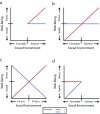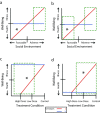How genes and the social environment moderate each other
- PMID: 23927504
- PMCID: PMC3778406
- DOI: 10.2105/AJPH.2013.301408
How genes and the social environment moderate each other
Abstract
Recent research has suggested that the social environment can moderate the expression of genetic influences on health and that genetic influences can shape an individual's sensitivity to the social environment. Evidence supports 4 major mechanisms: genes can influence an individual's response to environmental stress, genes may enhance an individual's sensitivity to both favorable and adverse environments, inherited characteristics may better fit with some environments than with others, and inherited capabilities may only become manifest in challenging or responsive environments. Further progress depends on better recognition of patterns of gene-environment interaction, improved methods of assessing the environment and its impact on genetic mechanisms, the use of appropriately designed laboratory studies, identification of heritable differences in an individual before environmental moderation occurs, and clarification of the timing of the impact of social and genetic moderation.
Figures


Similar articles
-
Genetic differential sensitivity to social environments: implications for research.Am J Public Health. 2013 Oct;103 Suppl 1(Suppl 1):S102-10. doi: 10.2105/AJPH.2013.301382. Epub 2013 Aug 8. Am J Public Health. 2013. PMID: 23927507 Free PMC article.
-
Genetic Variation in the Social Environment Contributes to Health and Disease.PLoS Genet. 2017 Jan 25;13(1):e1006498. doi: 10.1371/journal.pgen.1006498. eCollection 2017 Jan. PLoS Genet. 2017. PMID: 28121987 Free PMC article.
-
[Posttraumatic stress disorder (PTSD) as a consequence of the interaction between an individual genetic susceptibility, a traumatogenic event and a social context].Encephale. 2012 Oct;38(5):373-80. doi: 10.1016/j.encep.2011.12.003. Epub 2012 Jan 24. Encephale. 2012. PMID: 23062450 Review. French.
-
Vantage Sensitivity: Environmental Sensitivity to Positive Experiences as a Function of Genetic Differences.J Pers. 2017 Feb;85(1):38-50. doi: 10.1111/jopy.12218. Epub 2015 Sep 9. J Pers. 2017. PMID: 26271007 Review.
-
The impact of gene-environment interaction on alcohol use disorders.Alcohol Res. 2012;34(3):318-24. Alcohol Res. 2012. PMID: 23134047 Free PMC article.
Cited by
-
Utilising Genetically-Informed Research Designs to Better Understand Family Processes and Child Development: Implications for Adoption and Foster Care Focused Interventions.Adopt Foster. 2019 Oct;43(3):351-371. doi: 10.1177/0308575919866526. Epub 2019 Sep 26. Adopt Foster. 2019. PMID: 31576061 Free PMC article.
-
Genetic vulnerability interacts with parenting and early care education to predict increasing externalizing behavior.Int J Behav Dev. 2014 Jan 1;38(1):70-80. doi: 10.1177/0165025413508708. Int J Behav Dev. 2014. PMID: 25067867 Free PMC article.
-
The Neurobiological Mechanisms of Generalized Anxiety Disorder and Chronic Stress.Chronic Stress (Thousand Oaks). 2017 Jan-Dec;1:2470547017703993. doi: 10.1177/2470547017703993. Epub 2017 Jun 8. Chronic Stress (Thousand Oaks). 2017. PMID: 29503978 Free PMC article.
-
Does the heritability of cognitive abilities vary as a function of parental education? Evidence from a German twin sample.PLoS One. 2018 May 8;13(5):e0196597. doi: 10.1371/journal.pone.0196597. eCollection 2018. PLoS One. 2018. PMID: 29738571 Free PMC article.
-
Underlying Mechanisms of Gene-Environment Interactions in Externalizing Behavior: A Systematic Review and Search for Theoretical Mechanisms.Clin Child Fam Psychol Rev. 2015 Dec;18(4):413-42. doi: 10.1007/s10567-015-0196-4. Clin Child Fam Psychol Rev. 2015. PMID: 26537239 Free PMC article.
References
-
- Shanahan MJ, Hofer SM. Social context in gene–environment interactions: retrospect and prospect. J Gerontol B Psychol Sci Soc Sci. 2005;60(spec issue 1):65–76. - PubMed
-
- Cadoret RJ, Yates WR, Troughton E et al. Genetic-environmental interaction in the genesis of aggressivity and conduct disorders. Arch Gen Psychiatry. 1995;52(11):916–924. - PubMed
Publication types
MeSH terms
Grants and funding
LinkOut - more resources
Full Text Sources
Other Literature Sources
Medical

